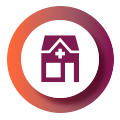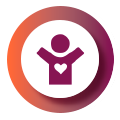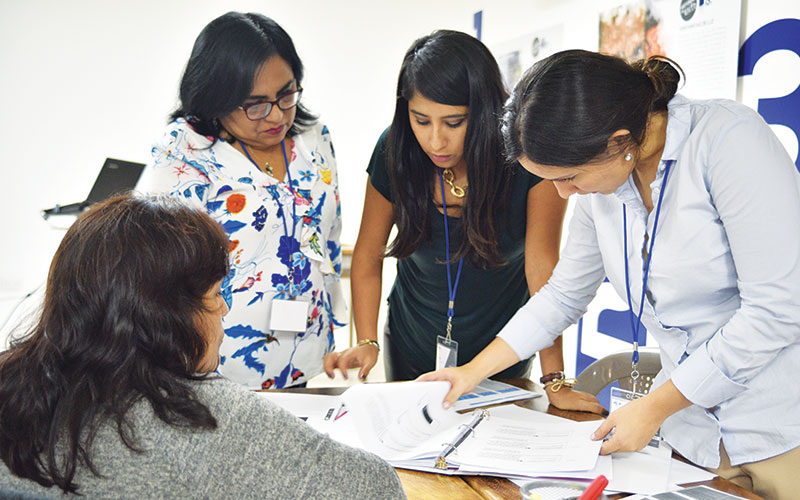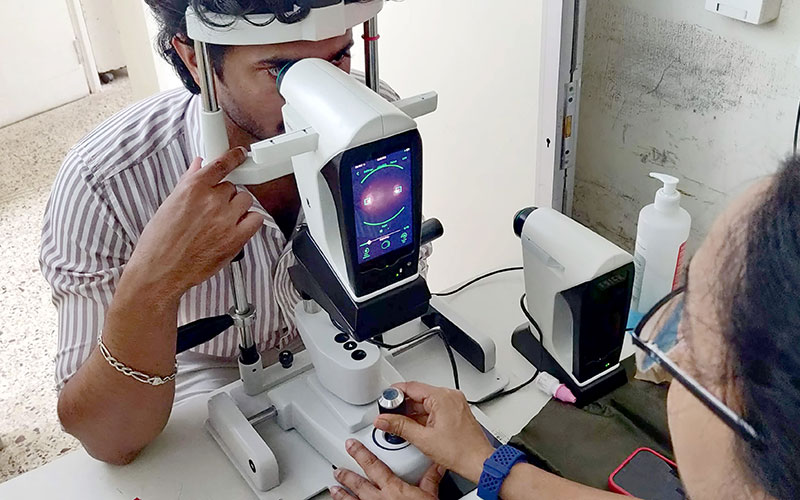Groundbreaking research from Seva Foundation, published in the World Health Organization Bulletin in 2023 proves that restoring sight is a "best buy" in global health and development, providing a 6x greater return compared to a typical investment across all of global development.
More children can receive an education, economic opportunity for parents increases, and entire communities and countries thrive.



Today, 1.1 billion people around the world live with preventable or treatable vision loss.
90% of all vision impairment occurs in people who live in low- and middle-income countries, where access to eye care is limited or nonexistent.

90% of all vision loss is treatable or preventable with inexpensive eyeglasses, medication, and surgery.

Watch the video above to see how patients regain not just their sight, but also their independence and their future.

Our Vision Centers are permanent, local clinics equipped to meet 80% of eye care needs, and refer patients who require more advanced care to nearby hospitals. Because locals can go to a Vision Center without having to travel far, they make eye care more accessible to women and other underserved people while spreading awareness and creating jobs that strengthen the local economy.

We train and create jobs for ophthalmic support staff to address basic eye health conditions and refer patients who need more advanced care. This greatly reduces the workload for ophthalmologists, who can now focus on more advanced cases, and creates more jobs at less cost. We're also improving efficiency by training and mentoring existing eye care providers in the design, management, and implementation of eye care programs.

We prioritize eye care for children – from screening and early diagnosis to referrals, treatments, and long-term followups. Our programs are embedded in schools and local community networks to increase eye care awareness and ensure that children with vision problems get the care they need for a bright future.

Our new portable retina camera is part of our technology toolkit to reach remote patients. We use tele-ophthalmology technology to provide patients in remote areas with access to eye care specialists who have become much more efficient as a result. Our investment in reducing the cost of intraocular lenses used for cataract surgery to just $2 per lens has allowed millions of people to see again who couldn’t previously afford the $300-$2,000 price tag of other major lens manufacturers. We continue to expand access for underserved populations by greatly lowering the cost of essential eye care medications.
We are an organization dedicated to evidence-based public health research. We're documenting the return on investment of our model, using the evidence for future investments to scale across Latin America and the world. By systematically collecting data to inform our strategic approach we can identify the specific needs of each community we serve, and how best to maximize our impact.




Research from Seva Foundation projects the cost of poor eye health in Guatemala is $808M per year, or 1% of GDP. A staggering statistic compared to the nation’s coffee industry revenue of $647M.
Victoria’s story is all too common. A 15-minute cataract surgery, a pair of eyeglasses, or medication is all that stands between a lifetime of darkness and a lifetime of sight for millions of people living with vision loss. People who can see and go back to work, learn, and lead independent lives.
Her parents saw a flyer for our partner clinic, where Victoria visited and received a cataract surgery through the generosity of Seva supporters.
Victoria went from a year of living in complete darkness to a lifetime of sight – after only 15-minutes on the operating table. Victoria can once again read, continue her work, and safely walk on her own without fear of falling or harassment.
Watch the video to see Victoria Isabel's story.
Visualiza Clínica Médica Oftalmológica, known simply as Visualiza, is a leading eye hospital in Guatemala and the rural Petén region. Visualiza works to prevent and cure blindness caused by major conditions including cataract and refractive errors. Founded in 1997, the hospital has been actively refining its unique community-oriented low cost and free service system. Although Visualiza employs only 4% of the nation’s ophthalmologists, the organization performs over 36% of all cataract surgeries in Guatemala. Visualiza’s hospitals provide private care alongside free vision services for their low-income patients.
Seva has been partners with Visualiza since 2006, working to spread their model of universal access to service. Visualiza serves as a mentor to five mentee hospitals in Latin America and the Caribbean, including Fundación Visión. Seva provides direct support for Vizualiza's clinical services and school screenings that help reduce avoidable blindness across Guatemala and restore sight to some of the country's most vulnerable populations, including women and children in rural communities. Seva is committed to augmenting Visualiza's service capacity with a focus on local staff development and management training. With Seva's ongoing support for skill-based training, Visualiza has become a resource to improve other eye care centers in Latin America.
Established more than three decades ago, Fundación Visión conducts 50% of all cataract surgeries in Paraguay. Fundación Visión boasts a team of 300 medical professionals, project managers, and surgeons working at clinics across the nation.
Seva has partnered with Fundación Visión since 2011. Together they have increased the reach of eye care services in Paraguay, making them available to more people who could not afford the services. Over the past two years, they worked together to complete the Rapid Assessment of Avoidable Blindness, in collaboration with the Ministry of Health. Fundación Visión has also received guidance and input from Visualiza and Seva as part of our larger ongoing work in the region.

* We won't share your email and you can unsubscribe at any time.
